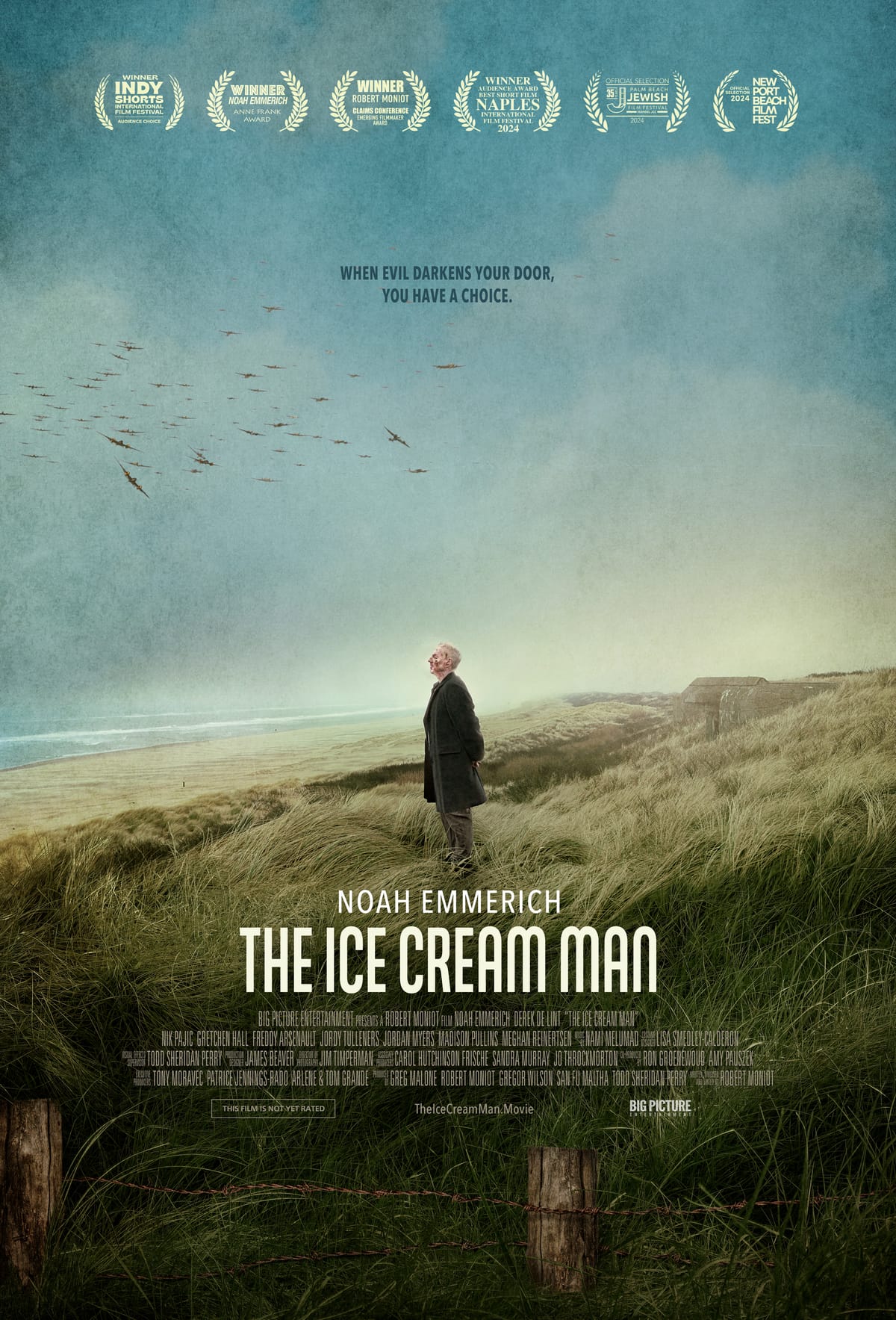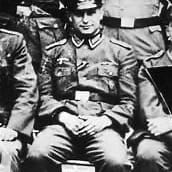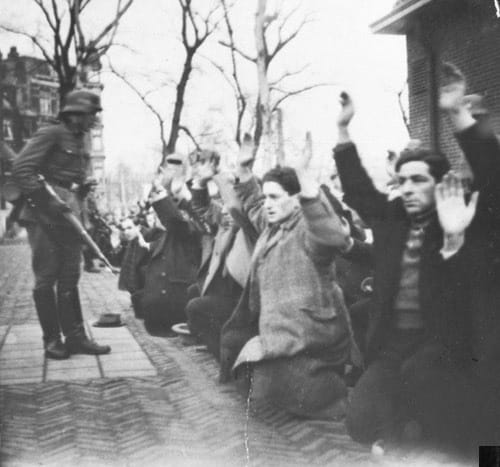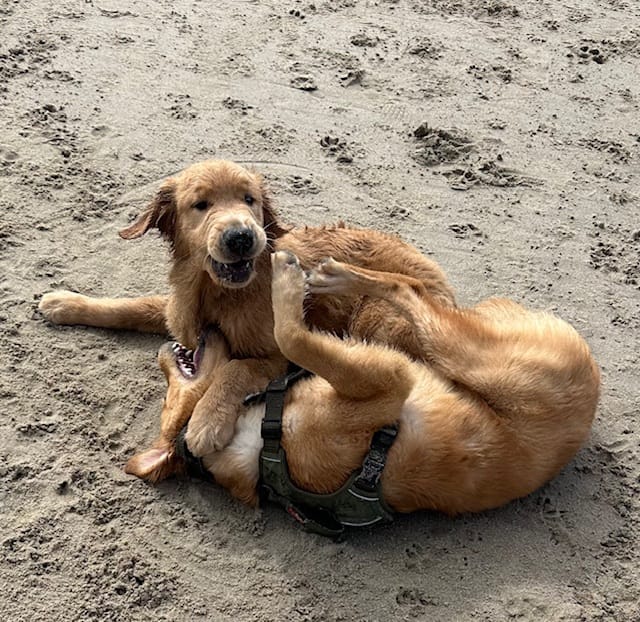"The Ice Cream Man" and the Holocaust Memories That Art Must Ponder



Well, it’s been one Hell of a week.
As the prelude to the coming `fight’ many are foreseeing, we may first have to find our own individual strengths in confronting the ascendancy of Trump. Personally, I found inspiration this week in the person of journeyman filmmaker Robert Moniot (pronouncd mon-yo), via his film “The Ice Cream Man.”
Moniot’s 36-minute short was made for well under a million dollars, and shot mostly in the Netherlands. It tells the story of the true-life, titular character Ernst Cahn (deftly played by Noah Emmerich of ”The Americans”), who defied the Nazis from the earliest days of their occupation of his country. We see in compact, well-written and played scenes, where Cahn abruptlyly went from the jolly,widely-loved owner of an ice cream parlor to summary execution after ten days of torture. The events around his death sparked a tumultuous street rebellion by the occupied Dutch, a moment all the more notable because the uprising was brief and gave way to harsher repression, and ultimately a widespread compliance by the population.
This is not to negate the actions of the Dutch resistance fighters. One such was my very distant—thus the alternative spelling—relative, underground operative Johannes Schreurs, who dispatched more than one Nazi before being captured and brutally tortured, but survived to manage not one but with two escapes from the Reich's prisons in France. One of the reasons Cahn, the hero of Moniot’s saga,, would not survive was that he was cannily singled out as an illustrative anti-Nazi figure by Klaus Barbie, the Gestapo chief whose later deeds made him notorious as The Butcher of Lyon. We meet him in a session with the local commandant, accompanied by the German shepherd he casually feeds treats to during a key moment. “Nik Pagic,” says Moniot, “who plays Barbie, was the actor that read for the role who went out and got a sandwich and sat down and started chomping [per the script], but also mimed throwing meat to the dog. Which was a level of of insult that I hadn't even considered. Barbie was very, very charming monster.”
Moniot’s film was recently honored with the top award among shorts at the Naples Film Festival, and has toured to warm reviews—perhaps warm enough to put it in position for an awards push. Whether or not the film can find its way into the ever-competitive Oscars shorts race, it has a making-of story that’s stuffed with serendipity and coincidence. It was nearly three years ago that Moniot chanced upon the Cahn family’s story as he researched his own family’s coming move to Holland when wife Stephanie (Van Hoff) Moniot faced a career move. An accomplished producer on such shows as “American Idol,” she switched tracks some 14 years go to work for the State Department. She’d been stationed at The White House, and, “We were supposed to be there for two years, when the State Department called and said, `Actually, can you go to the Netherlands, like, right now?' We asked the kids [four delightful youngsters who briefly draped themselves on their dad near the end of our Zoom chat] if that was cool with them, and that's why we're here.
“That night I Googled the address of the house we were going to be living in--and looked for the closest beach, because the family loves to go to the ocean. And, it was idyllic, white sand dunes and sea grass. Then, it was also Google that said, in the bottom right hand corner, that this was the the place where the Nazis executed over 300 resistance fighters during the war. And I instantly, as a filmmaker, had the picture of a man with his hands tied behind his back in front of the firing squad on that dune. I just kept reading to the story of Ernst. the first person that the Nazis executed. And when I read that it was Klaus Barbie that personally targeted him and then arrested and tortured him,then led the firing squad that executed him, I couldn't believe that it wasn't a story that I'd heard before, and that wasn't already a movie.”
Moniot first held thoughts of writing a feature when another coincidence came via an ad on the Deadline Hollywood site--an offer of $50K for the winning Holocaust-themed screenplay to be chosen by judges on behalf of an organization founded in 1951--The Conference on Jewish Material Claims Against Germany, known as Claims Conference. Moniot scrambled to the task with just six days to submit his script. In February 2023, his hastily-drafted screenplay for the short was named winner of the Emerging Filmmaker Contest focused on the Holocaust.
The $50K in seed money was sufficient to launch a fund-raising campaign in living rooms and conference suites, no small thanks to planting Emmerich in the starring role. The seasoned actor;'s call back with a`yes’ came quickly: “Noah's father, and Noah's aunt, with their parents fled Nazi Germany around 1936, moved to Amsterdam, and lived right around the corner from the same ice cream parlor Anne Frank frequented. In fact, Noah's aunt was classmates with Anne Frank. So Noah said, “I'm in.”
Moniot was gratified to show the massive Amsterdam street protests (see photo of the Nazi response above) but notes that the short-lived fervor yielded to betrayals, “After that one, bright, shining moment where the Dutch stood up and defied the Nazis. You know, the history in the Netherlands is more Jewish people were, were killed, were taken by the Nazis and executed than in any other country in Europe, and that's because the Dutch were getting paid to to sell them out. So there's a very, very dark history of compliance.”
Moniot hopes the dramatization of Cahn’s story can cure what the Claims Conference, in addition to funneling billions to Holocaust victims, aims to do—reduce a growing denialism, or plain ignorance of the Holocaust: “I think you have to tell the story of the amazingly brave step that the Dutch people collectively took, but then also talk about their failures afterwards, if you're ever going to have a shot at having a message not only resonate, but educate. We're also developing a curriculum with the Anne Frank Center that will accompany the film as we give it away to museums, schools and libraries, and teach the lesson of the amazing, outsized impact that one individual can have on their community, as evidenced by what Ernst Cahn did, and all these other stories I’ve found as well. In an era of episodic streaming, Moniot can foresee widening the focus: if you expand the short film to an hour, and do a series of resistance stories all throughout Europe during World War Two, because any story of resistance right now, I feel, is relevant.
“I think that would be a public service and also incredibly entertaining.”


Comments ()